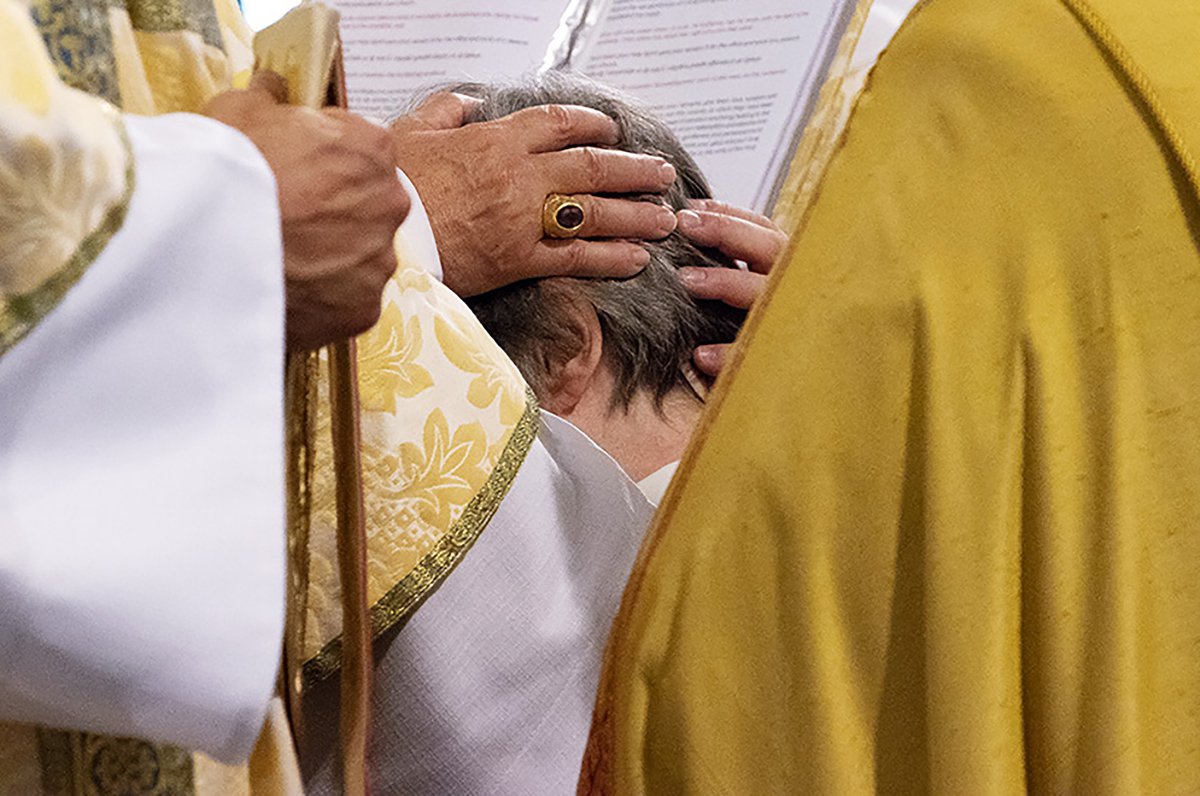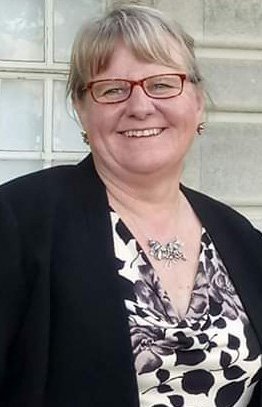Making Christ’s love visible through service to others

Next month, Sue Northcott will be ordained as Deacon at Brecon Cathedral. Here, Sue tells us about her journey and how she is preparing for her ministry.
On September 27, 2020 (God willing) I will be ordained to Holy Orders as a Deacon in the Church in Wales at Brecon Cathedral. It should have taken place on June 28, but Covid got in the way of this, and many more important things.
What does that mean, and how did I get here?
The Church in Wales is part of the Christian Anglican Communion. We are a Trinitarian faith, believing in one God comprising Father, Son (Jesus Christ) and Holy Spirit https://www.churchinwales.org.uk/en/faith/ .
I was brought up in the Christian faith, but moved away from the church as a teenager when doing my membership classes in my local Methodist church. Being of a scientific mind I felt there were too many questions that couldn’t be answered, I also thought that I wasn’t a good enough person to be a Christian. I never lost my faith, but would never say ‘I’m a Christian’. When I had my kids in my 30s, however, I wanted them to have the same chance as I did to know the faith, so I took them to Sunday school. When they were enjoying themselves with Bible stories and crafts, I sat through the adult service. I gradually found myself feeling more and more at home. I had become comfortable with the questions that couldn’t be answered, and embraced my faith. In 1999, I was confirmed in my faith by the Bishop of Swansea and Brecon, at St Mary’s Clydach.
In 2017, I graduated with a Level 5 Apprenticeship in Leadership and Management, my first academic success since some really poor A-Levels back in the early 80s. A colleague asked if I would be carrying on studying. I had been toying with the idea of an Open University degree, with the aim of becoming a counsellor. What came out of my mouth, however, wasn’t this. I said the words “I’m going to be a vicar”. She wasn’t shocked, but I was. I went home and told my husband. He said: “I’ve been waiting for this for years.”
I started to talk to my priest, friends and family about my ‘calling’. One of my friends drew particular attention to my voluntary work, which is very much in line with the pastoral care provided by church ministers. She pointed to a Bible reading from 1 Corinthians 15:46, which can be summarised as “First the physical, then the spiritual”. That led me to take the next step and begin the discernment process, where the church decides if a person is really being called by God and is suitable to be trained for ministry.

After months of form filling, meetings and soul searching, I found myself invited to a three-day long, residential, interview with the Bishop’s Discernment Panel. Anglicans recognise three orders of clergy, the Diaconate (deacons), the Presbyterate (priests) and the Episcopate (bishops and archbishops). Every priest is first ordained as a deacon, and every bishop is first ordained as a deacon and then a priest. Due to my personal circumstances, I am not currently able to commit to full-time ministry, but the Diocese of Swansea and Brecon allows for non-stipendiary Local Ministry, where the person operates, unpaid, in their local area. That’s what I applied for, to become a part-time priest in the community.
I had already started studying for a level 4 qualification in Theology with St Padarn’s Institute in the September of 2018, and my interview was scheduled for early December. A few days before I found myself in a right old state. I was wracked with anxiety and convinced that everything would go terribly wrong. I’d almost decided not to go at all, but a few days before I was due to leave I had a quiet day booked at Nicholaston House on the Gower. We started the day, as usual, with prayer. The weather was changeable but I was so full of emotion that I thought that a brisk walk might help clear my head. As I reached the top of Cefn Bryn, in tears, a sharp, heavy, thunderstorm broke and soaked me completely. Then, over the Loughor Estuary, three rainbows appeared. As I stared at them, the storm stopped and the skylarks began singing. I gave in. I shouted aloud “OK. You win!” I returned to the house wet, muddy, resigned but full of joy.
The Discernment Panel process was one of the most intense and challenging experiences of my life. In a snowy Llangasty Retreat House I was confined with my four interviewers and my fellow applicants for three days. As well as formal interviews, where our motives, personalities and abilities were rigorously examined, and practical exercises where our reactions to others could be observed, we ate, worshiped and lived together for that time. The only time I had alone, I was in the loo, or asleep. For an introvert, who needs a fair bit of ‘me’ time each day, this was really difficult. I survived, but I was glad to head home and be able to hide in my bedroom for a few hours. I had no idea how I had done, but it was out of my hands.
Just before the Christmas, I received a letter from my Bishop accepting me as an Ordinand, a trainee priest.
Since then my life has been even more madly busy than ever. I’m still working full-time, and am co-chair of our mental health staff-networking group. I’m a town councillor and volunteer at the local food bank. I’ve had to give up a few things, like my choir membership, something has to give. I’m doing my academic study at night classes and in weekend seminars. I love the classes, but hate the assignments with a passion. I’ve passed my level 4, but I’m expected to achieve at least a level 5 in Theology. My practical training is taking place at my local church, with short placements elsewhere. I also attend quarterly weekend residential training and summer schools. These give me a chance to meet up with my fellow ordinands to share notes and build an invaluable support network. The training of a priest is called ‘formation’, as it is meant to change and develop you. Formation sounds gentle, but I have found the process to be quite difficult and personally challenging. More like the forging of metal. To help me through this I have a spiritual director, a sort of mentor, and a formational cell made up of others who are going through the same process. Both of these provide safe spaces to discuss any problems and to pray together for the support we need.
So, in September, I will be made a deacon by the Archbishop of Wales (by praying and the laying on of hands). The ‘deacon’ comes from a Greek word for servant. Jesus called his disciples to be servants to all, and as a sign, he washed their feet:
‘So if I, your Lord and Teacher, have washed your feet, you also ought to wash one another’s feet.’ (John 13:14).
Deacons wear a prayer stole, a special scarf, as a sign of their role in the church. A deacon’s stole is worn diagonally across the body and represents the towel that Jesus wrapped around him as he washed the disciples’ feet. This is as a constant reminder both to the deacon and to the people they serve that we are all called at our baptism to serve one another, following the pattern of Jesus Christ.
As a deacon I will become a ‘clerk in Holy Orders’, I will be allowed to use the title ‘Reverend’ and wear a dog collar (clerical collar). I will be licensed to conduct funerals and baptisms. I will read the gospel, preach and assist the priest at Holy Communion. Most importantly for me, I will continue to work in the community, and seek to make Christ’s love visible through service to others.
If all goes well, I hope to be ‘priested’ a next year. I will continue to serve in the Parish of Llangiwg, alongside the vicar. In addition to the tasks of a deacon I will then be able to lead a service of Holy Communion (consecrate the bread and wine), pronounce absolution (forgiveness of sins), and to Bless people and anoint them with holy oil for healing/the last rites. I will also be licensed to conduct weddings in the Church in Wales.
During lockdown, my IT skills have proved really useful in my ministry. I’ve been able to record, edit and publish weekly services on the parish Facebook page. I’m also running twice-weekly prayer service via teleconference, which have proved very popular with those comfortable with technology, as all you need is telephone. We are reaching more people than we do in our physical services, so the parish is keen to see our online presence continue even when our church reopens. With this in mind, I’ve been attending St Padarn’s seminars on the use of social media, which have given me some ideas to play with.
My ordination will take place at Michaelmas, the period around the feast of St Michael and All Angels. This is one of the ‘Ember Days’ which are set aside for special prayers, fasting and the ordination of clergy. Those being ordained often send Ember cards, asking for the prayer and spiritual support of those who know them. I need all the love and support I can get, so I’ll gladly accept any kind thoughts and prayers for the next stage of my journey.
Please keep me in your thoughts.
Sue
For more information, see https://www.stpadarns.ac.uk/en/